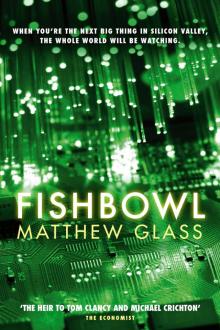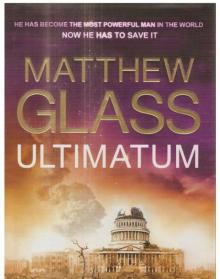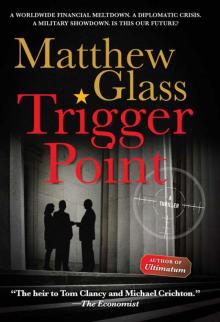- Home
- Matthew Glass
Ultimatum Page 4
Ultimatum Read online
Page 4
No, it was a strategy that just happened to fit the unilateralist prejudices of Mike Gartner and his entire administration. And one which conveniently might have allowed him to pull off a miracle win in an election he had all but lost.
“Get the details,” said Benton.
Eales nodded. “I’ll get with Riedl for a briefing. I want to see exactly what they offered.”
“And talk to the navy woman as well. Directly. Don’t trust Riedl.”
There was silence again. Joe Benton tried to come to grips with the numbers he had heard, what it would mean for his presidency. Most of the damage was inevitable, even if rapid cuts in emissions could be negotiated. Gartner had mentioned a fivefold increase in the impact. If Benton had thought he was facing a challenge with the scale of relocation he had known about, now that looked almost easy.
What would this do to his plans? Day one, behind the desk in the Oval Office, what should he do about it?
Eales’s thoughts had gone in the same direction. “Do you want to bring Angela in on this?”
Benton thought for a moment. “No. I don’t think so. Not yet, anyway. Not before I figure out where this is going.”
“I agree,” said Eales. “And we keep Jodie away from it.”
That hardly needed an answer. The last person Joe Benton wanted involved at this point was his communications director.
Day one wasn’t far away. This would affect everything, his legislative program, the economy, his foreign policy. Benton knew that he urgently needed to start thinking through the implications. But he didn’t have a team on board yet, not one to which he could confide information of this sensitivity.
Yet of the people who could help him, there were two, at least, who had already agreed to join his administration.
~ * ~
Thursday, November 18
Georgetown, Washington, D.C.
Jackie Rubin and Alan Ball came in by the front door. The senator wasn’t too worried if they were seen arriving at his Georgetown home by press who were watching the street. Although he hadn’t made any announcements yet, Rubin had agreed to leave the House of Representatives to become director of the Office of Management and Budget, and Alan Ball was slated to be the national security advisor. They arrived at eleven p.m. The Bentons had just returned from a dinner for the Health Advocacy Forum, an activist organization they had supported for years.
Heather showed Ball and Rubin in. The senator was taking a call from Hugo Montera, a New Jersey lawyer he wanted as his Secretary of Labor. When the call was finished he joined them.
Rubin was in her forties, with an earnest, expressive face and short dark hair. Ball was a small, dapper man with a head that seemed too large in proportion to the rest of him. He was currently professor of international relations at the Kennedy School, prior to which he had been chair of the UN commission on viral pandemics and global avoidance. Further back he had served six years as an assistant director of national security.
John Eales joined the group as well. Benton gave a short introduction, stressing that no one outside this group, and an equally small number of people in the Gartner White House, knew what they were about to discuss. Then he asked Eales to give a briefing. Eales had spent a half day with Art Riedl getting full coverage of the negotiations with the Chinese, and another half day with Dr. Richards. He summed up concisely.
“What I want to do tonight,” said Benton when Eales had finished, “is get the thinking going on this. I’m not looking for decisions yet, obviously. Let’s get some first thoughts on what you see as the implications, any ideas for how we take this forward, and then we can all go away and think about it a little more. Let’s start with your initial reactions. First of all, from each of your perspectives, then we can loop back to the bigger picture.”
Alan and Jackie looked at each other.
“Go ahead,” said Ball.
“Gee, thanks, Alan.”
There were smiles for a moment. Then a serious frown came over Jackie’s face.
“Speaking off the top of my head . . . The first thing that occurs to me is, I’m not sure where we go with our domestic programs if we have to absorb a hit like this. We’ve agreed all along that we ought to expect a deficit at least half as big again as the deficit the administration projected in the campaign, but this is a whole nother issue. If we’re really looking at thirty or forty trillion more over the next ten years, that’s almost...we’re talking about numbers that are getting up towards half our total budget. Proportionately, that’s probably more than we’ve ever spent even in a war situation.” Rubin paused. “I’ll check that. Maybe we’re going to need to think of ourselves as kind of a war economy. There’s going to be a massive transfer of productivity from consumption to capital investment just to replace infrastructure.”
“We already anticipated that,” said Eales.
“But not on this scale. Without seeing the figures, I’m guessing this is so big you can’t expect to manage it within the economy as usual and there’s going to have to be a significant restructuring of the allocation of resources. In other words some kind of central involvement in the allocation.”
“In the allocation only, or in the investment?” Benton asked.
“I’m guessing both.” Rubin frowned. “I have to think about this. And I need to get the numbers and have some work done on them.”
Benton nodded. “Anything else?”
“I’m worried about what this does to our programs in the short term. Health and education in particular. If we’re looking at something on this scale, are we going to be able to do better than just pick people up and move them and put them in a trailer somewhere like Gartner was proposing?”
“We have to do better than that,” said Benton.
Jackie nodded. The frown on her face deepened.
Benton turned to Ball. “Alan?”
“If you’re asking from my perspective as potentially a national security advisor, I guess my first thoughts are, Gartner went bilateral to try to deal with this with China, and that’s not our style. I don’t think anyone here is going to say we shouldn’t be putting this into the Kyoto process like you said we’d be doing all through the campaign.”
Benton gazed at him. “Go on.”
“Even if we had any doubts, what Gartner’s told us just demonstrates why that approach won’t work.”
“Because the Chinese didn’t cut a deal?”
“Exactly.”
“Why is that, do you think?” asked Benton. “They face the same problems as us. John has just said, the projections show swaths of their southern coast becoming uninhabitable because of inundation and storm activity, and they’ll have a considerably greater problem than us with desertification in their central provinces.”
“Exactly,” said Ball again.
“Then shouldn’t they have done a deal?”
“Joe, they’re not going to do it bilaterally. Particularly not with a president who’s desperate to do it for electoral reasons.”
“But they should have figured they’d get a better deal in that situation than they could get any other time,” said Eales.
“True. And yet still they didn’t do it. Doesn’t that prove my point?”
“On the other hand,” said Eales, “maybe they figured a president who cut a deal out of desperation wouldn’t be able to get the Senate to ratify, and they’d be left exposed. If that’s the case, if they wouldn’t do one with a president who was desperate for electoral reasons, maybe they’ll do one with a president who isn’t.”
Benton glanced at Eales. He knew that the big Chicagoan often tested ideas to destruction by getting behind them and seeing what arguments came back, even when he didn’t agree with the ideas himself.
Ball smiled. “You can’t have it both ways, John.”
“Sure, but what I’d like to know is which way is the right way.”
Ball laughed.
Benton was thinking through the implications of what Ball had sa
id. “What you’re suggesting, Alan, is by making this information public, taking it into the Kyoto process, that makes China more likely to cut a deal.”
“And everyone else. Not just China. India, the EuroCore, Japan, Brazil, Russia. All the big emitters.”
“Plus a hundred and fifty other countries,” said Eales.
Benton glanced at Eales again. A hundred and fifty countries. He could imagine the special pleading, the side deals, the concessions, the watering-down that would go on to get a deal between so many parties. Mike Gartner’s words came back to him. Spend two years negotiating, another five years verifying and finding out no one’s in compliance, then start negotiating again. And all the time, the feedback loop would be ramping itself up. He couldn’t help thinking that cutting a simple, straight, sanctions-backed deal with China—if it could be done—and then using that deal as combined leverage with everyone else, really was an attractive alternative.
Throughout the campaign, Joe Benton had been rock solid in support of Kyoto 4, which was scheduled to kick off toward the end of the following year. He had promised that his administration would create a leadership role for the United States within the process so that this Kyoto treaty, unlike its three predecessors, would provide the framework for a truly just and lasting solution to the emissions problem. But Benton knew that his statements about a leadership role in Kyoto were generic, and he and his advisors had done very little thinking about what this would actually translate to, or what could realistically be expected out of the new treaty. He was also sufficiently self-aware to know that, like many incoming presidents, he had little direct experience of foreign affairs, and he felt that this was where he would be most vulnerable when it came to heading the executive. Listening to Gartner had made him feel like a novice, and Benton was pretty sure Mike Gartner was aware of it. Enjoyed making him feel like that. Yet on this question Gartner really did know what he was talking about, a lot better than Joe Benton did. Gartner had been a midwife to Kyoto 3, as much as any American politician had been. It was his signature on the treaty. If he had opted for a bilateral approach with China now, maybe there really was more to it than the hope of pulling a rabbit out of a hat before the election.
“This gives us the chance to truly take leadership on Kyoto,” said Alan Ball. “I’ll put some thoughts in a paper on how we use this to seize the agenda.”
Benton nodded. “Thank you, Alan. That would be good.” He paused. “Okay, let me turn this to something else. It’s Inauguration Day. Do I make this public? I could announce it and say we’re using whatever plan we’ve come up with to seize the Kyoto agenda. Alternatively, I could keep it quiet like Gartner did, at least for a while, until the timing’s right. Hope it doesn’t leak. If it leaks, say its speculation, say it’s just a scenario, there’s no certainty. I want to think about the options politically. John, why don’t you kick off?”
Eales was silent for a moment. “My first thought is there’s something attractive about announcing it. Just throwing it out there. One, you don’t face the risk of leaks, no one’s going to turn around and say you’ve misled the people. Two, it’s like you throw down a challenge to the American people. In a way, that’s what our whole campaign was about. Here’s a challenge, I’ve got the courage to admit it, now let’s rise to it together. That worked. It caught the mood of the American people. So we can ride that mood. Now it’s just, okay, the challenge is bigger. If anyone can put that out there, Senator, it’s you. You’ve earned that right. You’ve earned that credibility. You could throw it out right there at the inauguration— we face this, we have to deal with it, join me, work with me. Together, we’ll overcome it.”
“Like Roosevelt,” murmured Rubin. “We have nothing to fear like fear itself.”
Eales nodded. “Exactly right, Jackie. We have nothing to fear but fear itself. And you also dis Gartner’s administration. Basically, you’re saying, he messed up, I’m going to clean up. You dissociate us from the problem. You associate us with the solution. That’s why it’s got to be day one. If we don’t do it day one, we lose that opportunity. It’s got to be absolute silence or complete confession.”
“What’s Gartner going to do?” said Alan Ball.
“He said he’ll go along with however I want to play it,” replied Benton.
“No, but if you dis him, what’s he going to do then? What are the Republicans going to do?”
“They’re a minority in both houses,” said Eales.
“But they’ve still got forty-three senators,” said Rubin.
Everyone in the room knew the significance of that number. To mount a filibuster, and cause endless obstruction to a president’s legislative program, the opposition party requires only forty senators on the Hill.
“There’s a half-dozen Republicans who’ll support our program,” said Eales. “Just give them the right incentives.”
“Not if you dis the party. Not if it turns partisan.”
“Everything’s partisan.”
“Not this partisan. Not like it is if you go out of your way to dis your predecessor.”
“Jackie’s got a point,” said Benton. “I want everyone in the tent that I can get, Democrat or Republican.”
“Senator,” said Ball, “I know we’re looking at this primarily in terms of domestic politics, but we need to think of the Chinese government as well. How does it make them look if we go public like this? It’s kind of saying, President Gartner couldn’t handle them, but we darn well will.”
“I won’t be saying that.”
“But that’s what it might look like. Seen from there, it feels aggressive.”
“Maybe we need to be aggressive,” said Eales.
“Senator,” said Rubin. “I’m going back to John’s idea. The Roosevelt idea. When John said it, I liked it. It’s bold, imaginative, honest. Like John said, that’s why the country elected you. And there’s a nice symmetry here. It’s exactly a hundred years since Roosevelt came to power. You could do a lot with that in your speech.”
“A second Gettysburg Address,” said Eales, only half in jest. “Five score years ago, a man stood in this place . . .”
Benton smiled briefly.
“Senator, I’m concerned that if you do that, it’ll deal a blow to your presidency you’ll never recover from.” Jackie frowned. “It’s not the same as Roosevelt. When Roosevelt came to power, the problem was clear. Two years of depression and an administration that was utterly unable to deal with it. Roosevelt could pose as being the solution. He didn’t put a drastic new problem in front of the people. When you get up on that podium January twentieth, Senator, there is no problem. Not this problem, anyway. Not until you start speaking. You put it there. And even though you didn’t make the problem, you become tainted with it. You’re the messenger. And the other thing is, Roosevelt had a solution. We don’t. All we can say is, if we convince other countries to get on board, then we’ll have a solution. If that’s all we do, if we just go with the problem, my fear is the problem is all anyone’s going to think about.”
“But we do have a solution,” said Ball. “We put it into Kyoto 4.”
“With respect, Alan, that’s a process, not a solution, and it’s not a process most of the American people have a lot of respect for. Senator, as it is now, what you’re going to be judged on is New Foundation. That’s something we can deliver, that’s something we can control. But if you put this out there on Inauguration Day, then that’s what the administration is going to be judged on: whether you get a solution out of Kyoto 4. And negotiations over setting up Kyoto 4 are going to take the best part of the next two years, which is when we should be getting your major programs in place. That’s the most viable period of your first term. So if your ability to execute New Foundation is hostage to progress on Kyoto 4, I think that’s a huge risk to everything we’re trying to do. Let’s be judged on New Foundation. Kyoto’s something you can’t control. In fact, the more that other countries see you’re being judged on it, t
he less control you have, and the more they’ll hold you hostage on it.”
“This is the single biggest problem we face,” said Benton. “Isn’t it right that I should be judged on it?”
“But there are other things, Senator. There are other things you want to do right away. Even if you can’t win on this thing, we can still do them. And like I said, they’re things we can control. Education. Health. Jobs. Relocation. Again and again, you’ve said you’re going to be a domestic president. I fear you won’t have a chance to do any of those things if you invite people to judge you on Kyoto 4. Senator, look how many years of Republican administration it took to get the chance to do something about these things, and I fear that if you stand up on Inauguration Day and start talking about what John has told us tonight, we’re going to lose it in the course of a single speech.”

 Fishbowl
Fishbowl End Game
End Game Ultimatum
Ultimatum Trigger Point
Trigger Point